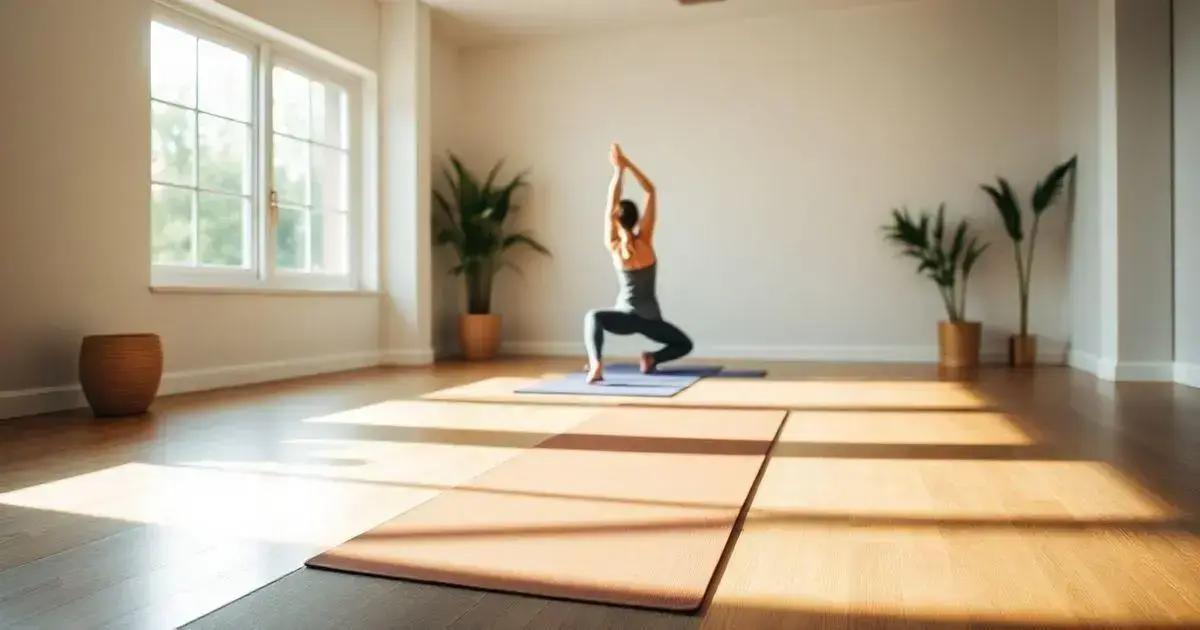To reduce morning stiffness with gentle stretching, incorporate simple exercises such as neck stretches, shoulder rolls, and hamstring stretches into your morning routine. Aim for 5-10 minutes of stretching each day, focusing on consistency and gradually increasing your flexibility to enhance overall well-being.
Are you waking up feeling stiff and uncomfortable? Morning stiffness can be a frustrating way to start the day, but it doesn’t have to be. How to reduce morning stiffness with gentle stretching is something many people are seeking. In this article, we will explore various stretches designed to relieve stiffness and improve flexibility. With just a little time spent stretching in the morning, you can significantly enhance your well-being and readiness for the day ahead.
Understanding Morning Stiffness

Understanding morning stiffness is crucial to tackling the discomfort that many experience upon waking. This stiffness can result from several factors, including aging, physical inactivity, or underlying conditions. When you wake up, your body has been in a static position for an extended period. As a result, the muscles and joints can feel tight and sore. Joint stiffness is a normal physiological process; however, it can be bothersome and may impact your day-to-day activities.
During sleep, movements are limited, and blood flow is reduced. This can lead to stiffness in the muscles and joints, especially for those who sleep in uncomfortable positions or have pre-existing conditions such as arthritis. The duration of this stiffness can vary; for some, it may only last a few minutes, while for others, it can persist longer into the morning.
Common Causes of Morning Stiffness
Several factors can contribute to morning stiffness. Here are some of the most common:
- Aging: As we age, our bodies produce less synovial fluid, which lubricates joints and helps to keep them mobile.
- Inactivity: Lack of movement during the night can lead to stiffness. Engaging in regular exercise can help counteract this effect.
- Arthritis: Different types of arthritis, such as osteoarthritis and rheumatoid arthritis, can cause significant morning stiffness and discomfort.
- Muscle Tension: Stress and anxiety can lead to muscle tension, which can worsen stiffness when waking up.
Recognizing the cause of your morning stiffness is the first step toward finding relief. Once you understand what is contributing to your discomfort, you can begin addressing it through lifestyle changes and gentle stretching exercises.
Why Gentle Stretching Helps
The incorporation of gentle stretching into your morning routine not only helps to reduce stiffness but also improves blood circulation. When you stretch, you send more blood to your muscles, which can enhance flexibility and mobility. Gentle movements can prepare your body for the day and help alleviate discomfort caused by being in a static position overnight.
The Benefits of Gentle Stretching

The benefits of gentle stretching are many, especially when it comes to alleviating morning stiffness. Incorporating gentle stretching into your morning routine can provide both physical and mental advantages that enhance your overall well-being.
Improves Flexibility
One of the most significant benefits of gentle stretching is improved flexibility. As we age, our muscles can become tight and less pliable. Gentle stretching helps to lengthen the muscles, making them more flexible and reducing stiffness.
Enhances Blood Flow
Gentle stretching increases blood circulation throughout your body. Better blood flow means that your muscles receive more oxygen and nutrients, which can help in recovery and reduce soreness. This is particularly important in the morning when your body has been inactive during the night.
Reduces Stress
Articulating the body through gentle stretching can have calming effects on the mind. Stretching releases tension in the muscles, which can significantly lower stress levels. As a result, you start your day feeling more relaxed and ready to face your daily challenges.
Promotes Better Posture
Engaging in gentle stretching can also improve your posture. Many of us adopt poor sitting positions during daily activities, which can lead to postural issues. By stretching key muscle groups, you can better align your body and develop muscle memory for standing and sitting properly.
Enhances Performance in Daily Activities
With improved flexibility and reduced stiffness, gentle stretching can enhance your performance in everyday movements. Whether it’s getting out of bed, bending to pick something up, or performing a specific activity, stretching prepares your body for movement.
Simple Stretches to Try

Here are some simple stretches to try in the morning to reduce stiffness and improve flexibility:
1. Neck Stretch
Start by sitting or standing comfortably. Slowly tilt your head to the right, bringing your ear towards your shoulder. Hold this position for 15 seconds, then switch sides. This stretch helps relieve tension in the neck.
2. Shoulder Rolls
While standing or sitting, roll your shoulders forward in a circular motion for 10 repetitions. Then reverse the direction and roll them backward for another 10 repetitions. Shoulder rolls help to release tension in the shoulders and upper back.
3. Cat-Cow Stretch
Get on your hands and knees in a tabletop position. Inhale deeply, arch your back (cow position), lifting your head and tailbone. Exhale slowly, rounding your back (cat position) and tucking your chin. Continue this flow for about 5-10 breaths to promote spinal flexibility.
4. Standing Hamstring Stretch
Stand up straight and lift one leg, placing your heel on a low surface or step. Keep your knee straight and lean forward gently from your hips until you feel a stretch in the back of your leg. Hold for 15 seconds on each side. This stretch is excellent for loosening tight hamstrings.
5. Seated Forward Bend
Sit with your legs stretched out in front of you. Inhale, reaching your arms overhead. Exhale and bend forward from your hips, trying to touch your toes. Hold this position for 15-30 seconds. This stretch helps to lengthen the spine and hamstrings.
6. Child’s Pose
Begin on your hands and knees, then sit back on your heels while reaching your arms forward on the ground. Relax your forehead on the floor and breathe deeply. Hold this pose for 30 seconds. Child’s pose is great for gentle stretching and relaxation.
Tips for a Consistent Routine

Establishing a consistent stretching routine can greatly enhance your experience in reducing morning stiffness. Here are some tips for a consistent routine:
1. Set a Specific Time
Choose a specific time each morning to dedicate to your stretching routine. This could be right after you wake up or after you brush your teeth. Consistency in timing helps to form this healthy habit.
2. Create a Comfortable Space
Designate a quiet and comfortable space in your home for stretching. Having a peaceful environment will encourage you to unwind and focus on your stretches without distractions.
3. Start Small
If you’re new to stretching, start with just a few minutes daily. Gradually increase the duration and number of stretches as you become more comfortable. Starting small makes it easier to stick with your routine.
4. Use Reminders
Set reminders on your phone or place sticky notes in visible locations to remind you to stretch each morning. Visual cues can help to reinforce your commitment to your stretching routine.
5. Mix it Up
To keep things interesting, vary your stretches each day. Try different types of stretches to target various muscle groups. This can prevent boredom and keep you motivated.
6. Track Your Progress
Consider keeping a journal or using an app to track your stretching progress. Recording how you feel before and after stretching can help you see improvements over time and motivate you to continue.
7. Involve Others
Invite a family member or friend to join you in your stretching routine. Having a partner can make stretching more enjoyable and hold you accountable to your commitment.
Embrace Gentle Stretching for a Better Morning
Incorporating gentle stretching into your morning routine can significantly reduce morning stiffness and improve your overall well-being. By understanding the nature of morning stiffness and recognizing its causes, you can effectively combat discomfort with simple and effective stretches.
The benefits of gentle stretching extend beyond just flexibility; they can enhance blood circulation, reduce stress, and promote better posture. Making stretching a consistent part of your daily life is key. Set a specific time, create a comfortable space, and keep your routine fresh to stay motivated.
Ultimately, a few dedicated minutes each morning can lead to a more flexible, relaxed, and energized you, transforming the way you experience your day.
FAQ – Common Questions About Reducing Morning Stiffness with Gentle Stretching
What is morning stiffness and why does it happen?
Morning stiffness is a common condition where joints and muscles feel tight and sore after being inactive during sleep. It can be caused by factors such as aging, arthritis, or poor sleeping posture.
How does gentle stretching help with morning stiffness?
Gentle stretching increases blood flow to the muscles, improves flexibility, and reduces tension, helping alleviate the discomfort associated with morning stiffness.
How long should I stretch each morning?
Start with about 5-10 minutes of stretching each morning. As you become more accustomed to stretching, you can gradually increase the duration.
What are some simple stretches I can try?
Some effective stretches include neck stretches, shoulder rolls, cat-cow stretch, standing hamstring stretch, seated forward bend, and child’s pose.
How can I maintain a consistent stretching routine?
To stay consistent, set a specific time for stretching, create a comfortable space, keep a journal of your progress, and consider involving a friend or family member.
Are there any risks associated with stretching?
While stretching is generally safe, it’s important to listen to your body and avoid pushing yourself too hard. Consult a healthcare professional if you have any concerns.













